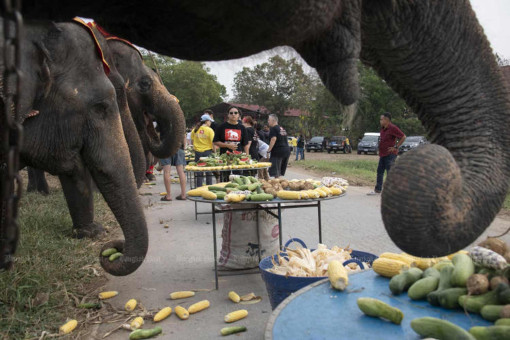Authorities taking steps to bring down the growing number of attacks on people
PUBLISHED : 13 Mar 2024 at 16:20
UPDATED : 13 Mar 2024 at 18:39

The national parks and wildlife chief has announced plans for training centres to discipline aggressive wild elephants involved in the increasing number of attacks on people.
Director-general Attapon Charoenchansa was speaking on Wednesday, National Elephant Day.
He said there were between 4,013 and 4,422 wild elephants in 16 forest complexes in Thailand and they posed serious problems, unlike domesticated elephants.
“Wild elephants must have proper and balanced living conditions, especially those in forests bordering communities, and people are increasingly being affected,” he said.
People hated wild elephants because they destroyed crops and attacked people. Since 2015 wild elephants had killed 210 people, Mr Attapon said.
The Department of National Parks, Wildlife and Plant Conservation has been trying to solve the problem. It was deploying 200 teams to discourage wild elephants from approaching human populations.
The department also planned to build centres to detain and train aggressive wild elephants, which would be released once they learned to coexist peacefully with people, he said.
One of the centres would be in Khao Ang Ruenai Wildlife Sanctuary, which extends over adjoining forests in Chachoengsao, Chon Buri, Prachin Buri, Rayong and Sa Kaeo provinces.
Others would be in Salakpra Wildlife Sanctuary in Kanchanaburi province, Kui Buri National Park in Prachuap Khiri Khan, Phuluang Wildlife Sanctuary in Loei, Khlong Saeng Wildlife Sanctuary in Surat Thani and Dong Yai Wildlife Sanctuary in Buri Ram, he said.
In addition, Mr Attapon said authorities would control the wild elephant population using birth control vaccines.
In a related development, World Animal Protection (WAP) marked the special day by releasing a report titled “Bred for Profit: The Truth About Global Wildlife Farming”. Thai elephants, it said, are among the animals that are widely bred and held in captivity to earn profits for the tourism industry.
According to the report, the number of captive elephants in the Thai tourism industry has increased by 1,100, or 134%, over the past decade.
Hatai Limprayoonyong, campaign manager for wildlife at WAP Thailand, emphasised the need for the government to address the problem as these elephants are being exploited.

